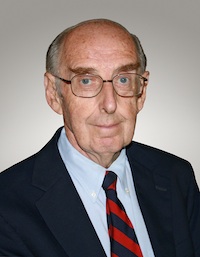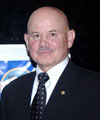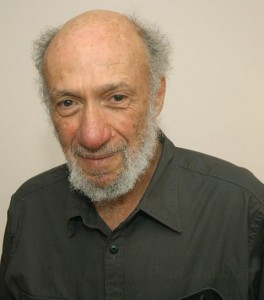
Jen Ziemke
Co-Founder and Co-Curator
Crisis Mappers Net

Jen Ziemke
Co-Founder and Co-Curator
Crisis Mappers Net
Ambassador Akbar Ahmed is the Ibn Khaldun Chair of Islamic Studies at American University in Washington, D.C. and Nonresident Senior Fellow at the Brookings Institution. He is a Visiting Professor and was First Distinguished Chair of Middle East and Islamic Studies at the U.S. Naval Academy in Annapolis, MD. He has taught at Princeton, Harvard, and Cambridge Universities and has been called “the world’s leading authority on contemporary Islam” by the BBC. Regularly interviewed by CNN, NPR, BBC, and Al-Jazeera, he has appeared several times on Oprah, and has also been a guest of The Daily Show and Nickelodeon. For the fall term 2012, Ambassador Ahmed was the Diane Middlebrook and Carl Djerassi Visiting Professor at Cambridge University and Visiting Fellow of Jesus College.
Continue reading “Who's Who in Peace Intelligence: Akbar Ahmed”

Colman McCarthy (born March 24, 1938 in Glen Head, New York), an American journalist, teacher, lecturer, pacifist, progressive, an anarchist and long-time peace activist, directs the Center for Teaching Peace in Washington, D.C. From 1969 to 1997, he wrote columns for The Washington Post. His topics ranged from politics, religion, health, and sports to education, poverty, and peacemaking. Washingtonian magazine called him “the liberal conscience of The Washington Post.” Smithsonian magazine said he is “a man of profound spiritual awareness.” He has written for The New Yorker, The Nation, The Progressive, The Atlantic, and Reader's Digest. Since 1999, he has written biweekly columns for National Catholic Reporter.
Continue reading “Who's Who in Peace Intelligence: Colman McCarthy”
Colonel Tony Pfaff, USA is a Foreign Area Officer for the Middle East and North Africa, currently serving as the Senior Military and Army Advisor to the Department of State. Colonel Pfaff began his military career as an Infantry officer and first served as platoon leader and company executive officer in the 82nd Airborne Division, with whom he deployed to Operations DESERT SHIELD and DESERT STORM. He then served as a company commander and battalion operations officer in the 1st Armored Division, with which he deployed to Operation ABLE SENTRY in the former Yugoslav Republic of Macedonia. Colonel Pfaff has also served on the faculty at West Point and as the Senior Intelligence Officer for the Joint Staff’s Iraq Intelligence Working Group. He has served twice in Iraq, once as the Deputy J2 for a Joint Special Operations Task Force, and as the Senior Military Advisor for the Civilian Police Assistance Training Program. Most recently, he served as the Defense Attaché in Baghdad and prior to that as the Chief of International Military Affair for Army Central Command and as the Defense Attache Kuwait. He also served as a consultant for the Independent Panel to Review Department of Defense Detention Procedures headed by former Secretary of Defense James Schlesinger and contributed to the ethics section of the Army and Marine Corps counterinsurgency field manual. Colonel Pfaff has a bachelor’s degree in Philosophy and Economics from Washington and Lee University, a master’s degree in Philosophy from Stanford University, a master’s in National Resource Strategy from the Industrial College of the Armed Forces, and a doctorate in Philosophy from Georgetown University.
“Risk, Military Ethics, and Irregular Warfare,” Foreign Policy Research Institute, E-Note, December, 2012, http://www.fpri.org/
“Aligning Means and Ends: Towards a New Way of War,” Military Review, September-October, 2011, pp. 78-83
“Ethics in Dangerous Situations,” with Ted Reich, Walter Redman, and Michael Hurley, in Patrick Sweeney and Michael Matthews, Leadership in Dangerous Situations (Naval Institute Press, 2011) pp. 121-138.
Resolving Ethical Challenges in an Era of Persistent Conflict (Strategic Studies Institute, March 29, 2011)
“Bungee Jumping Off the Moral High-ground: The Ethics of Espionage in the Modern Age,” published in Ethics of Spying: A Reader for the Intelligence Professional, Jan Goldman, ed. (Scarecrow Press, 2009)
Development and Reform of the Iraqi Police Forces (Strategic Studies Institute, January 25, 2008)
“Officership and Character,” in The Future of the Army Profession, Don M. Snider, ed. May 2005
The Ethics of Espionage,” in the Journal of Military Ethics, Vol 3, Issue 1, 2004, pp. 1-15
“Officership: Character, Leadership, and Ethical Decision Making” in Military Review January-February 2003, pp. 66-71.
“Military Ethics in Complex Contingencies,” published in The Future of the Army Profession, 2nd Ed., Don Snider and Lloyd Matthews, eds. (McGraw-Hill, 2002), pp. 409-428
Peacekeeping and the Just War Tradition (Strategic Studies Institute, September 01, 2000)
Army Professionalism, the Military Ethic, and Officership in the 21st Century (Strategic Studies Institute, December 01, 1999)
“Toward an Ethics of Detention and Interrogation: Consent and Limits,” published in Philosophy and Public Policy Quarterly
“Chaos, Complexity, and the Modern Battlefield,” published in Military Review, pp. 83-86
“Developing Commanders for Peace and War,” with Dr. Don Snider, Major John Nagl, in Culture and Command, Strategic Policy Studies 3 published by The Strategic Policy Studies Group of the Britannia Royal Naval College and Exeter University, 2000.
“Homeland Defense and Issues of Civil Military Relations,” in …to insure domestic Tranquility, provide for the common defence… published by Strategic Studies Institute, US Army War College, Strategic Studies Institute, December 2000.With Dr. Don Snider, Major John Nagl,
“Peacekeeping and the Just War Tradition” in Pacem, (Norwegian Military Journal)Issue Nr 2, 2000.
 The Small Wars Journal Blog has a post previewing a new book by Andrew Mackay and Steve Tatham. Behavioural Conflict: Why Understanding People and Their Motives Will Prove Decisive in Future Conflict considers how the West's Post Cold War conflicts have been fought amongst people rather than between armies. From publisher's description:
The Small Wars Journal Blog has a post previewing a new book by Andrew Mackay and Steve Tatham. Behavioural Conflict: Why Understanding People and Their Motives Will Prove Decisive in Future Conflict considers how the West's Post Cold War conflicts have been fought amongst people rather than between armies. From publisher's description:
“These people, amongst others, have been Mendes, Kissis and Konos (and the 13 other tribes of Sierra Leone), they have been Serbo-Croats, Bosnians, Kosovars, Albanians, Unizzahs, al-Ribads, al-Zobaids, Kurds, al-Montifig (and the other tribal groups of the nearly 40 that make up Iraq), Pashtuns, Hazaras, Uzbecks (and the other 6 ethnic groupings that make up Afghanistan's rich tapestry of population), they have been Sunni, Shia, Orthodox, Agnostic, Christian, Catholic; they have been farmers, politicians, police, administrators, businessmen, narco khans, war lords, men, women and children. In fact you can divide them in any one of a hundred or so different ways but the only certainty is that all of these groups and people will exhibit behaviour, that may appear utterly irrational but for better or worse will have profound effects upon the manner in which military missions are conducted.”
The book is based on a paper written in 2009 for the Defence Academy of the United Kingdom. The tale of the lone Afghan farmer sowing seeds in a field near the Kajaki Dam should be a warning to those from the developed world who underestimate the intelligence of people just because they don't speak English or have grown up without electricity and running water.
This book will have utility for anyone working in military, peacekeeping, policing or any other other cross cultural situation.

Gary I. Wilson: G.I. Wilson is a retired Marine Corps Colonel and combat veteran with 33 years of military service and several years of experience in law enforcement-emergency services. He is a member of the International Association of Chiefs of Police (IACP), Marine Corps Intelligence Association (MCIA), Association of Former Intelligence Officers (AFIO), American Society for Industrial Security (ASIS), FBI Infragard Program, Naval Intelligence Professionals (NIP), Society of Competitive Intelligence Professionals (SCIP), Disabled American Veterans (DAV), Veterans of Foreign Wars (VFW), Military Order of World Wars, Association of Threat Assessment Professionals (ATAP), Forensic Expert Witness Association (FEWA), and serves on the Board of Directors for Bossov Ballet Theatre, San Diego County Crime Stoppers, and Palomar College Education for Heroes Foundation. He is widely published in professional journals, appears on national television, radio, and in documentaries. He coauthored a 1989 professional paper that coined the term “fourth generation warfare (4GW).” He has BA in psychology from the State University of New York at Albany and MA in Bushiness and Organizational Security Management from Webster University. He is currently pursing another graduate degree in forensic psychology. Personal military awards include the Legion of Merit, Bronze Star, and several Combat Action Ribbons.

Richard Falk is the Albert G. Milbank Professor Emeritus of International Law at Princeton University and the Bette and Wylie Aitken Distinguished Visiting Professor of Law at Chapman University School of Law.

His book, The Great Terror War (2003), considers the American response to September 11, including its relationship to the patriotic duties of American citizens. He published Costs of War in 2008. He is also the author or coauthor of numerous additional books, including Religion and Humane Global Governance; Human Rights Horizons; On Humane Governance: Toward a New Global Politics; Explorations at the Edge of Time; Revolutionaries and Functionaries; The Promise of World Order; Indefensible Weapons; Human Rights and State Sovereignty; A Study of Future Worlds; and, This Endangered Planet. He is coeditor of Crimes of War.
He received his B.S. from the Wharton School, University of Pennsylvania; L.L.B. from Yale Law School; and J.S.D. from Harvard University.
Falk at Transnational Foundation for Peace and Future Research
See Also:
Chuck Spinney: Richard Falk on USG Learning Disability